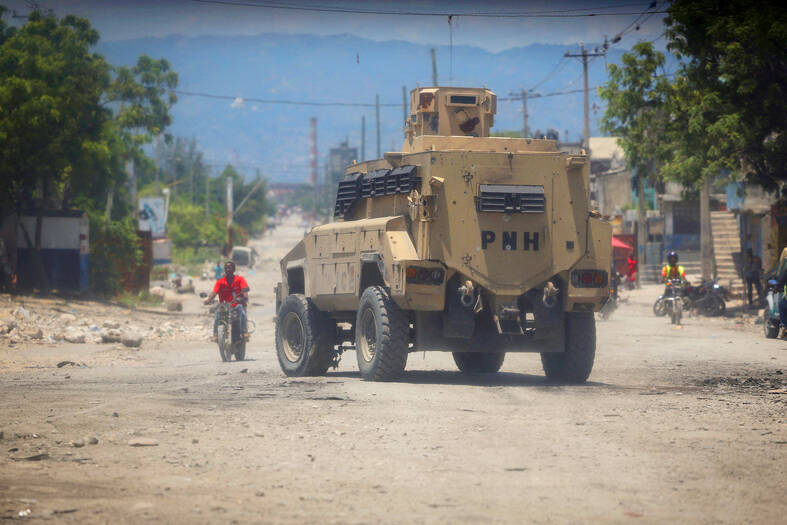Two rival gang leaders signed a truce to end armed conflict in Haiti’s largest shantytown, a community leader said on Thursday.
Haiti has long been rocked by gang violence, but conditions sharply worsened at the end of February when armed groups launched attacks in Port-au-Prince to overthrow then-Haitian prime minister Ariel Henry.
The gangs control 80 percent of the Caribbean country’s main roads and are accused of murders, rapes, looting and kidnapping for ransom.

Photo: Reuters
Under the agreement between leaders of the G9 and G-Pep groups, roadblocks in the Cite Soleil shantytown of about 300,000 inhabitants were taken down, said Pastor Jean Enock Joseph, an influential figure in the commune.
“A new stage has just been reached,” Joseph said.
However, a similar truce had been signed in July last year before falling apart a few weeks later, he added.
Like much of Port-au-Prince, Cite Soleil residents were unable to move freely in the shantytown — divided into zones controlled by the rival gangs — for fear of being caught in crossfire.
The G9 and G-Pep gangs have not clashed since February, when they joined a coalition fomenting coordinated attacks to overthrow Henry, but they had maintained the divisions within Cite Soleil until Wednesday.

A magnitude 7.0 earthquake struck off Yilan at 11:05pm yesterday, the Central Weather Administration (CWA) said. The epicenter was located at sea, about 32.3km east of Yilan County Hall, at a depth of 72.8km, CWA data showed There were no immediate reports of damage. The intensity of the quake, which gauges the actual effect of a seismic event, measured 4 in Yilan County area on Taiwan’s seven-tier intensity scale, the data showed. It measured 4 in other parts of eastern, northern and central Taiwan as well as Tainan, and 3 in Kaohsiung and Pingtung County, and 2 in Lienchiang and Penghu counties and 1

A car bomb killed a senior Russian general in southern Moscow yesterday morning, the latest high-profile army figure to be blown up in a blast that came just hours after Russian and Ukrainian delegates held separate talks in Miami on a plan to end the war. Kyiv has not commented on the incident, but Russian investigators said they were probing whether the blast was “linked” to “Ukrainian special forces.” The attack was similar to other assassinations of generals and pro-war figures that have either been claimed, or are widely believed to have been orchestrated, by Ukraine. Russian Lieutenant General Fanil Sarvarov, 56, head

FOREIGN INTERFERENCE: Beijing would likely intensify public opinion warfare in next year’s local elections to prevent Lai from getting re-elected, the ‘Yomiuri Shimbun’ said Internal documents from a Chinese artificial intelligence (AI) company indicated that China has been using the technology to intervene in foreign elections, including propaganda targeting Taiwan’s local elections next year and presidential elections in 2028, a Japanese newspaper reported yesterday. The Institute of National Security of Vanderbilt University obtained nearly 400 pages of documents from GoLaxy, a company with ties to the Chinese government, and found evidence that it had apparently deployed sophisticated, AI-driven propaganda campaigns in Hong Kong and Taiwan to shape public opinion, the Yomiuri Shimbun reported. GoLaxy provides insights, situation analysis and public opinion-shaping technology by conducting network surveillance

‘POLITICAL GAME’: DPP lawmakers said the motion would not meet the legislative threshold needed, and accused the KMT and the TPP of trivializing the Constitution The Legislative Yuan yesterday approved a motion to initiate impeachment proceedings against President William Lai (賴清德), saying he had undermined Taiwan’s constitutional order and democracy. The motion was approved 61-50 by lawmakers from the main opposition Chinese Nationalist Party (KMT) and the smaller Taiwan People’s Party (TPP), who together hold a legislative majority. Under the motion, a roll call vote for impeachment would be held on May 19 next year, after various hearings are held and Lai is given the chance to defend himself. The move came after Lai on Monday last week did not promulgate an amendment passed by the legislature that